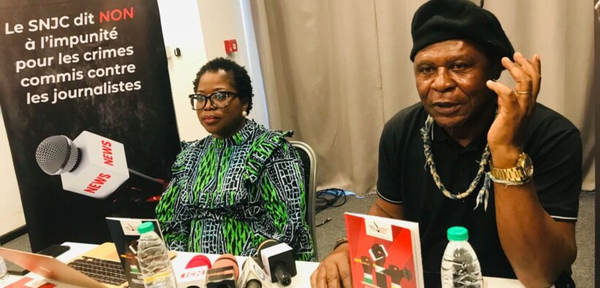- Details
- Society
Press Freedom Under Siege: SNJC Condemns Increasing Intimidation of Journalists in Cameroon
The National Union of Journalists of Cameroon (SNJC) views the frequent questioning of media professionals as a calculated strategy aimed at silencing dissenting voices.

In recent months, the Cameroonian press has faced a series of relentless attacks threatening the very foundation of freedom of expression. Following a string of journalist summons, intimidation tactics, punitive measures, and new financial burdens, the media sector finds itself caught in a tightening grip of repression.
In a statement released on October 3, the SNJC vehemently condemned what it perceives as a targeted campaign against press freedom. Citing instances of punitive measures taken against five media outlets and numerous journalists during the 43rd ordinary session of the National Communication Council (CNC) on August 8, the union expressed outrage over the imposed sanctions, which range from warnings to six-month suspensions. Furthermore, numerous television and radio hosts have received intimidating letters urging them to moderate their tone or restrict certain topics, under threat of more severe consequences.
Alarming Police Summons
Among the cases highlighted by the SNJC is that of the news director of Galaxie TV, based in Garoua, who was summoned by police on September 19, 2024. According to the SNJC, intelligence agents attempted to suggest a specific angle for coverage on a particular subject, aiming to "restrict the journalist's freedom, that of the media, and ultimately the citizen, who would be served information tailored to please select interests," stated Marion Obam, president of the SNJC, in her declaration. The underlying goal, she asserts, is to silence those who dare to raise uncomfortable questions or critique the authorities.
In addition to this case, the union also noted the summons of two other journalists—one from FM Bénoué and another from Radio Salaam—accused of public insults and electronic defamation by the General Intelligence services. The SNJC contends that these repeated summons reflect an increasingly tense atmosphere between security forces and the media, where journalists are viewed as targets to be neutralized, particularly during sensitive periods such as pre-election campaigns. "Nothing, not even the pretext of the election period, can justify this behavior, which not only tarnishes our country's image but also lowers our rankings in international organizations," insists Marion Obam.
Call for Resistance and Boycott
Amidst this oppressive environment, a new financial burden has also struck the media sector. A provision in the Finance Law now requires journalists to pay a fee of 100,000 FCFA for any accreditation when covering an event. The SNJC warns that "this fee constitutes a serious infringement on the right to access sources."
In this heavy atmosphere, the SNJC urges journalists to continue their work with professionalism and to resist yielding to fear. The union also calls on industry members to boycott government events unless concrete measures are taken to ensure the flourishing of the press, while criticizing the reduction of support for private media outlets.
Conclusion
The growing repression faced by journalists in Cameroon calls for urgent attention and action. The SNJC's stance signifies a critical juncture in the fight for press freedom, and it is imperative that the media community stands united against these intimidating tactics to preserve its integrity and independence.
- Details
- News Team
- Hits: 1165
Local News
- Details
- Society

Kribi II: Man Caught Allegedly Abusing Child
- News Team
- 14.Sep.2025
- Details
- Society

Back to School 2025/2026 – Spotlight on Bamenda & Nkambe
- News Team
- 08.Sep.2025
- Details
- Society

Cameroon 2025: From Kamto to Biya: Longue Longue’s political flip shocks supporters
- News Team
- 08.Sep.2025
- Details
- Society

Meiganga bus crash spotlights Cameroon’s road safety crisis
- News Team
- 05.Sep.2025
EditorialView all
- Details
- Editorial

Robert Bourgi Turns on Paul Biya, Declares Him a Political Corpse
- News Team
- 10.Oct.2025
- Details
- Editorial

Heat in Maroua: What Biya’s Return Really Signals
- News Team
- 08.Oct.2025
- Details
- Editorial

Issa Tchiroma: Charles Mambo’s “Change Candidate” for Cameroon
- News Team
- 11.Sep.2025
- Details
- Editorial





